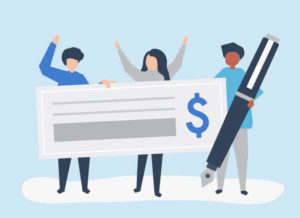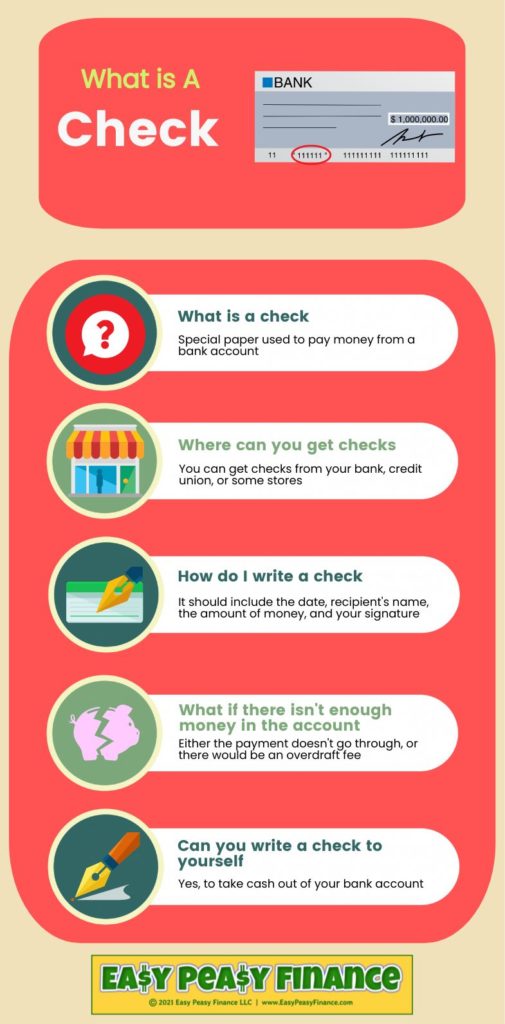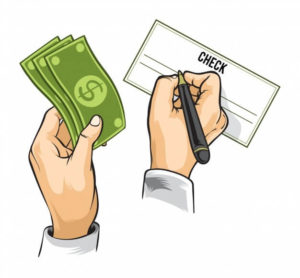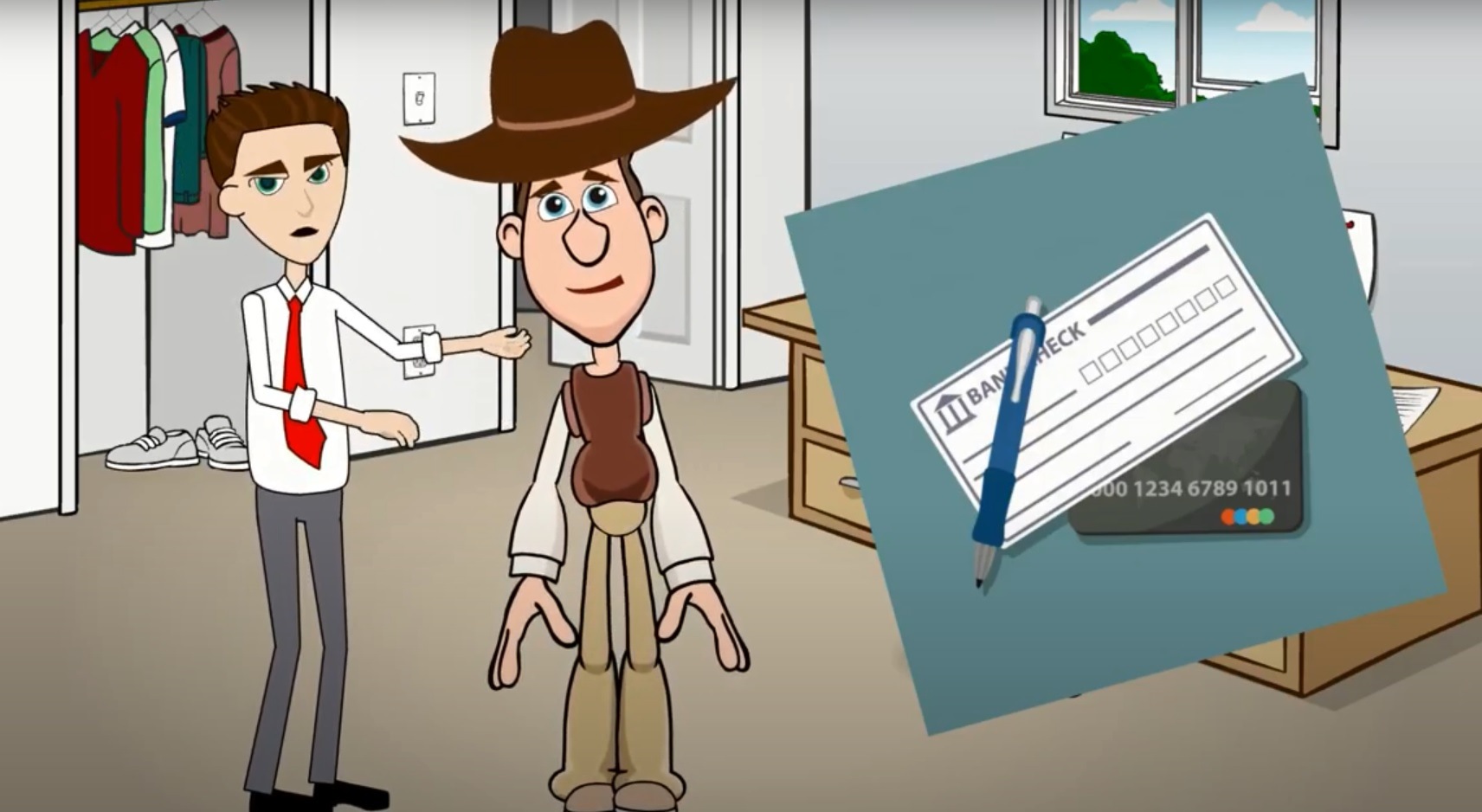Introduction to a Bank Check for Kids and Teens
This video explains the concept of checks in a simple, concise way for kids and beginners. It could be used by kids & teens to learn about a check (or cheque), or used as a money & personal finance resource by parents and teachers as part of a Financial Literacy course or K-12 curriculum.

Suitable for students from grade levels:
- Kindergarten
- Elementary School
- Middle School
- High School
The topics covered are:
- What is a check
- How does a check work
- What information is needed to write a check
- What if there isn’t enough money in the account
- Who can issue a check
- Are there different types of checks
Old Version
- What is a check (or cheque)
- Who can write one
- Where does the money for the check come from
- How long does it take for the money to transfer from one account to another
- Can you write a check to yourself
- Where can you get checks from
- How to write a check
- What if you write a check and there isn’t adequate money available in the bank account

Infographic: Click Here to Download
What is a check?
A check (also known as a personal check) is a signed document that instructs a bank or other financial institution to transfer a certain amount of money from the payor to the payee.
The payor is the one writing the check and the payee is the one receiving the funds.
Checks are a convenient way to pay bills, give gifts or transfer money without the need of physical cash. But they are becoming less common due to newer payment methods such as credit cards, direct deposit, online banking, and ACH transfers.
Checks are very secure, because a stolen check can’t be cashed – the payee is the only one who can receive the money in the check.
How does a check work?
Once the payor writes the check, he then gives the check to the payee – this could be in person, or through mail. Then, the payee goes to the bank to cash the check by depositing it in his account.
Once the bank verifies the details, the money is deducted from the payor’s account and is added to the payee’s account.
Nowadays, checks can also be deposited online using the bank’s app, by just taking a photo of the check.
What information is needed to write a check?
Some of the details you need are the date, the name of the payee, the amount of money being transferred (both in numbers and words for security), and your signature.
If any of this is missing, the check will not go through. There is an optional memo line, which the payor can use to mention the reason for the check.
What if there isn’t enough money in the account?
In most cases, the check will ‘bounce’ and will not be honored. In addition, the payor will be subject to fees such as non-sufficient fund (NSF) fee and returned check fee. In some cases, the payee is also charged a fee.
Alternatively, if you’ve opted for an overdraft facility, the check will go through using money temporarily lent by the bank. In this case you would need to pay back the overdraft amount, along with a fee.
Who can issue a check?
The majority of personal checks are issued by the bank where the payor has the checking account.
There are also online printing services where checks can be purchased.
Are there different types of checks?
Yes, there are many types like certified checks, traveler’s checks, cashier’s checks, money order, paychecks, etc.
What is a Check: Old Version
I heard that someone made a check for a lot of money. But…
What is a check, anyway?
Well, a check is a special kind of paper that you can use to pay money to someone else.
Who can write a check?
A person who has a checking account in a bank can write a check, for money out of that checking account.
But, does the money come from the checking account?
Yes, it does. Very good question.

How long does it take for a person to get the money?
Well, usually it takes 2 to 3 days, so it’s not immediate.
Okay, but can I write a check to myself?
Yes, you can write a check to yourself. You can use that for taking money out of your account, if you’re not using an ATM, or Automated Teller Machine. Only in this case, you get the money immediately.
Yay!!!
But where can I get the checks from, anyway?
Well, usually you can get blank checks from your bank. But you can also buy them from other sources and private companies.
Can I make my own checks?
No, that would be fraud. But you can usually customize your checks. For example, you can have a background of your choice or your address can be printed on the check.
But how do I even write a check?

Well, you just need:
- The date
- The name of the person you’re paying the money to
- The amount of money you’re paying to that person in numbers and words, and
- The most important part – your signature. Because without the signature, your check will not go through and you will not be able to pay that person.
Oh, okay, then the signature is really important!
Yes, it is very important.
Writing a check with not enough money in the account
But what happens if I write a check for more money than that’s there in my account?
Well, that is a special situation called an overdraft. There, you are charged an overdraft fee. But we’ll cover that in the future video.
And one more thing, Sooper Cooper. Remember, finance is your friend!
Note: ‘Cheque’ is another commonly used spelling for a bank check.
Conclusion
Do you use checks? Or you use other modes of payment, like online transfers?
Let us know in the comments below!
Video Featured in the Below Financial Literacy Course for Kids & Teens
Download Transcript: Ideal for Use by Teachers in their Lesson Plan to Teach Kids & Teens
Podcast: What is a Check (or Cheque)?
Fun, informative and concise episodes by a 10-year old, breaking down complex financial concepts in a way that kids and beginners can understand. Episodes cover personal finance topics like saving, investing, banking, credit cards, insurance, real estate, mortgage, retirement planning, 401k, stocks, bonds, income tax, and more, and are in the form of a conversation between a cowboy (a finance novice) and his friend, a stock broker. Making finance your friend, only at Easy Peasy Finance.
A little bit about me: I have been fascinated with the world of personal finance since I was 6! I love to read personal finance books, and keep myself updated on the latest by reading various personal finance magazines. My friends often ask me questions about finance because they find it complex and intimidating. That’s what inspired me to start my YouTube channel called Easy Peasy Finance when I was 8, and this podcast 2 years later.
Everything about a checking account: what is a checking account, do you make any money – like interest – from a checking account, why should you have a checking account – the advantages, how many checking accounts can you have, can you move money from one checking account to another, who needs to have a checking account, how can you open a checking account, what are the fees and charges, and more.
Show notes and transcript at: https://easypeasyfinance.com/what-is-a-checking-account/


